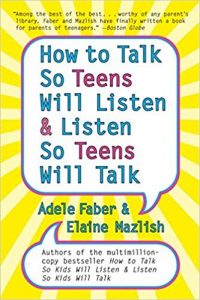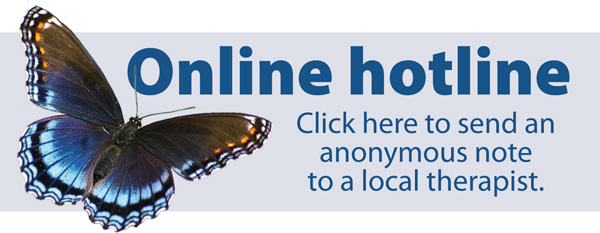Hi. My daughter is 14 years old and is a good student in 8th grade. I’m worried because recently she has started spending long amounts of time alone in her room. She dresses in black, has no friends and cries in secret. I’ve tried talking to her but she doesn’t open up with me. She says that no one notices her at school. No one really wants to talk to her, and she says it feels like she is not there. I offered for her to see a counselor, but she doesn’t want to do that. She goes to a church group for teens on Sundays, but she is always alone — separate from the group. I’d like to help her and maybe find a support group or some activities where she can make friends. Please help me figure out what to do. Thank you!
Response by Erin Goodwin, MS, LPC
It sounds like you’re doing a great job of noticing that something is different because you’re checking in on your daughter. Though you’re saying she doesn’t open up to you, she has shared some of her feelings about being isolated. You are doing the right thing by continuing to check in with her and approach her with concern.
As caregivers, it’s a natural instinct for us to want to fix the problem for the child, but often that’s not what they need or want. Sometimes they just need you to hear them. One way to get your teen to talk to you more is to show her you’re really listening when she does share things. You can do this by just simply acknowledging her emotions. Respond with things like, “I see,” or “it sounds like you are feeling lonely,” and then wait for her to continue so she feels safe to share.
 Sometimes allowing this space for her to share will help her come up with her own ideas on ways to address the problems she’s facing. Before signing her up for activities, see what she might like to do and what thoughts she has about getting more involved. Then ask how you can support her in that. The book titled How to Talk So Teens will Listen and Listen So Teens Will Talk by Adele Faber and Elaine Mazlish has more details and information regarding these conversation skills.
Sometimes allowing this space for her to share will help her come up with her own ideas on ways to address the problems she’s facing. Before signing her up for activities, see what she might like to do and what thoughts she has about getting more involved. Then ask how you can support her in that. The book titled How to Talk So Teens will Listen and Listen So Teens Will Talk by Adele Faber and Elaine Mazlish has more details and information regarding these conversation skills.
The teenage years are definitely a challenging time when it comes to peer relationships. They become more and more crucial to our kids and also more complicated. In a literature review published in Child Trends, “As children age into adolescence, parents often think that they become less important in the healthy development of their children. Our review of social competency in adolescence highlights the continued need for supportive and warm relationships between parents and youth. We find that quality relationships with parents are key to the development of social competency. Click HERE for a printer-friendly research findings on helping teens develop social skills and relationships.
So while you’re looking to find other activities for her to engage in, continue your focus on your relationship with her as well. It seems like the communication you have now is a good foundation for a strong relationship which will help her in the long term.
 Something you will want to monitor in your child, both in person and through online activity, are any warning signs for suicide, such as saying she doesn’t want to be around anymore or no one would notice if she were gone. If you notice these signs, calmly and directly ask your daughter, “Are you thinking about suicide or hurting yourself?” Make sure you use a genuine, caring tone and are careful not to sound threatening or judgmental so that she is more likely to be honest with her answer.
Something you will want to monitor in your child, both in person and through online activity, are any warning signs for suicide, such as saying she doesn’t want to be around anymore or no one would notice if she were gone. If you notice these signs, calmly and directly ask your daughter, “Are you thinking about suicide or hurting yourself?” Make sure you use a genuine, caring tone and are careful not to sound threatening or judgmental so that she is more likely to be honest with her answer.
If she says yes, that she has thought about it, do NOT panic or overreact. The best thing to do is let her know that you will need to get her some help. Ozark Guidance has a crisis line 24/7 at 479-750-2020 where you can speak with a mental health professional regarding next steps. If you child is actively suicidal, you can reach out to a local acute care facility, Springwoods Behavioral Health 479-973-6000 and Vantage Point 479-521-5731.
If she is not actively suicidal, the symptoms you mentioned above still sound indicative of depression. This could be better clarified with a mental health professional through an assessment. There are many ways to reach out for support through school counselors, local agencies and counseling services. Let her know that she may not have an option in that treatment is needed at this point, but she can be in charge of deciding which counselor she sees. If she meets with someone she doesn’t connect with, then she can ask for someone else. Sometimes the idea of counseling can be intimidating for teens, but once they meet the person with whom they will talk, it becomes easier.
Therapists at Ozark Guidance would be happy to answer your questions and read what’s on your mind. Click the butterfly icon below to fill out an anonymous submission form with your question or concern. The form contains NO identifying information and is designed to give local women an online place to share concerns with a person qualified to offer feedback.
 Disclaimer: This RESPONSE does not provide medical advice It is intended for informational purposes only. It is not a substitute for professional medical advice, diagnosis or treatment. Never ignore professional medical advice in seeking treatment because of something you have read on nwaMotherlode or Ozark Guidance websites.
Disclaimer: This RESPONSE does not provide medical advice It is intended for informational purposes only. It is not a substitute for professional medical advice, diagnosis or treatment. Never ignore professional medical advice in seeking treatment because of something you have read on nwaMotherlode or Ozark Guidance websites.






